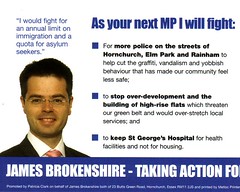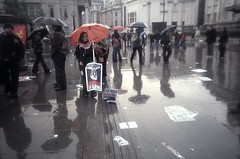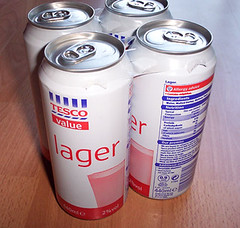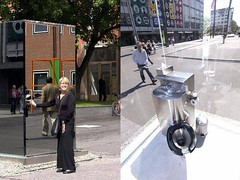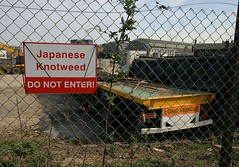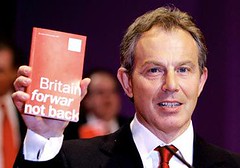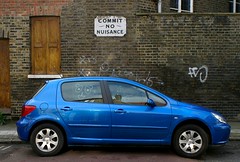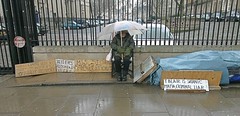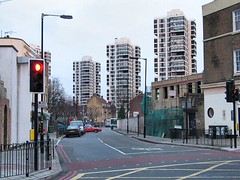
Voting for a large supermarket chain instead of a political party may at first seem a ridiculous idea.
But think about it some more.
Government occupies most of its time collecting, then spending, money and an increasing amount of that money is spent through private contractors rather than public servants. From refuse collection through to health care, more and more public services are being delivered by private companies. The reasoning behind this is that the discipline of market forces delivers the best return for tax payers’ money.
There’s a lot to be said for this point of view. Take transport for example...
We took the train to Norfolk last week and the 270-mile round trip for the two of us came to just over £80.
In my kitchen cupboard there’s a 400g tin of Tescos Value Range chopped tomatoes that came all the way from Argentina, about 7,000 miles. It cost me eight pence.
Based on some typical recent journeys we’ve made, the weight-adjusted cost for the two of us to travel one way to Argentina would be something like…
- London Underground £10,750
- London Bus £5,600
- Main Line Train £1,850
- Private Car £900
- Ryan Air £500
- In the form of two very large tins of Tescos Value Range chopped tomatoes £32.51
There are a couple of lessons to be learned from this admittedly crude exercise…
- The more ecologically sensible the mode of transport the more expensive the cost
- The more political involvement in the mode of transport the more expensive the cost
The problem is that even though companies are becoming more involved in the delivery of public services there is one sector that is closed to them – the overall management of those services. Not only are they held back by being managed by politicians whose only attribute is the ability to bullshit, the companies also have every incentive to steal as much as they can from the State whilst lobbying for and executing their contracts. Neither would be the case if a company were in overall charge.
That’s why we should be able to vote for Tescos.
In particular, I’m just itching to see how corporate management would deal with the issue of crime on Britain’s streets.
I’m a great fan of Robocop.
The quarterly crime figures for Britain were announced last week. These figures have become a regular source of national amusement for a couple of reasons:
- Two sets of figures from two different sources are released simultaneously. Both sets of figures invariably contradict each other
- When a particular category of crime shows a rise the government always attributes the rise to improved recording procedures. Any fall in a crime category is described as the result of successful government policy.
Once the figures are announced, Tony Blair always:
- Congratulates himself on doing such an excellent job
- Announces some nonsense target. I particularly enjoyed his pledge to ‘cut street crime in half by the end of the year’ a couple of years ago. That was a good one. Last week he pledged ‘a 15% reduction in overall crime by 2008’.
Yes, Tony Blair, the Terminator of Bullshit. He is out there. He can't be bargained with. He doesn't feel pity or remorse or fear. And he absolutely will not stop. Ever…
Tony seems to believe that he is in possession of some kind of magic formula than enables him to control and predict crime rates. If so, you’ve got to ask why doesn’t he go the whole hog and reduce crime by something like 80%; leaving 20% back so that life doesn’t get too boring.
I’m not really sure that many people believe the government story that crime is falling. I certainly don’t. Most nights in my part of South London it sounds like they’re remaking the chase scene from the Blues Brothers. I’ve no doubt that certain categories of crime are on the wane - heroin now sells at prices comparable to cappuccino which means crackheads have to steal and whore themselves less to sort themselves out and, thanks to the Chinese, most consumer goods; stereos, DVDs, CDs, are so cheap it’s hardly worth bothering to steal them any more. In the same way that armed payroll robberies, highwaymen and horse theft don’t preoccupy many people any more, some crimes just fade away. But is that anything to do with the government?
Anyway, whilst there is some dispute as to whether overall crime in the UK is falling there’s little doubt that nasty, violent crime is on the increase. There’s also no doubt that the number of police has increased in recent years but most of them spend their time raiding bedsits in search of poisoned toothbrushes or protecting empty office buildings from bogus terror threats.
What we need is a truly massive increase in police numbers. We need Tescos Value Range police.
Actually, we sort of already have a Value Range police force. They’re called Community Support Officers. Just like real police only much cheaper and without the training, or the powers, or the equipment, or the credibility. Most of them are also quite short. And, as with the Value Range, people laugh at them openly in public. I saw a group of ten or twelve auxillary constables parked near my house a couple of weeks ago. In keeping with their value for money image they were all mounted on 125cc scooters rather than motorbikes. I vainly tried edging closer to grab a photo of the posse and their hogs but one of them told me to piss off. Clearly there was a significant risk that I was either a) a terrorist planning a terror attack on the Brixton Road or b) a smart arse with a camera looking to ridicule them.
Now if Tescos were in charge of policing they’d offer Luxury, Everyday and Value ranges of law enforcement. As with the food products, residents in more affluent parts of the country would probably choose Luxury Range Police; well mannered, in spiffy uniforms and fully equipped with the latest equipment. Whereas the residents of Lambeth would probably be protected by swarms of cheap police imported from some 3rd World fascist junta; dressed only in sweat stained vests and army surplus trousers and armed with big wooden clubs.
I think the concept is a goer. It would work I tell you.
Also, if we do get round to electing a supermarket to government we could then also think about incorporating the country down the line. In fact, every other country in the world could join in and we could trade shares in each other on an international stock market. Wouldn’t that be fun?
But that’s another post…
